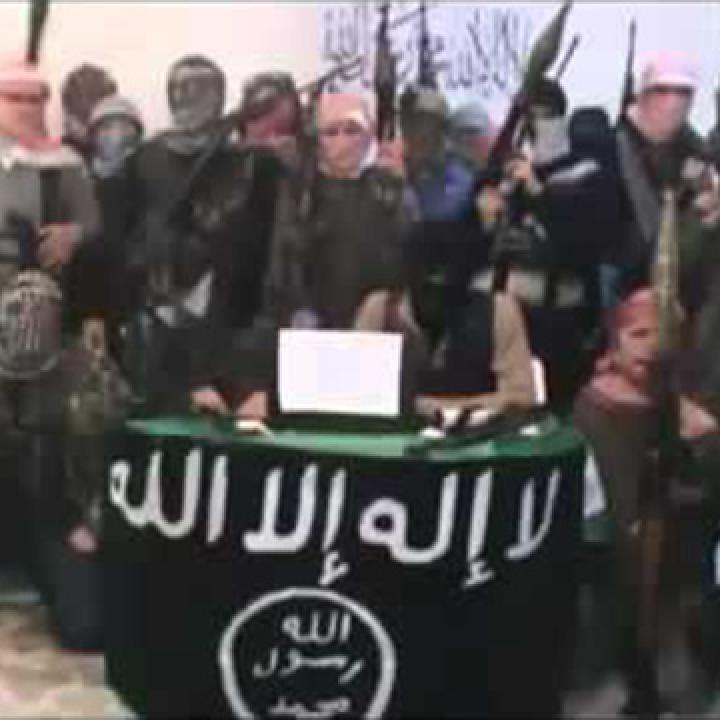

Traveling through southern Turkey, an expert spoke with Syrian opposition members about how to come together politically while keeping al-Qaeda affiliates at arm's length.
Sit down and talk with members of the Syrian opposition about the growth of extremism and many will blame the United States. They say that Washington gets groups like Jabhat al-Nusra "all wrong" because the group is far better than more extreme ones like the Islamic State of Iraq and al-Sham (ISIS).
It is completely understandable that the Syrian opposition feels let down by Washington's Syria policy, particularly its failure to follow through on its threat of punitive strikes against the Assad regime for use of chemical weapons. But that doesn't mean the Syrian opposition should hand over their dearly-fought revolution to al-Qaeda affiliates like Jabhat al-Nusra. Softer tactics or not, the group represents a foreign infiltration whose radical extremist ideology is contrary to the ideas that are mobilizing Syria's democratic movement and degrades the Syrian opposition's credibility in the eyes of the Syrian people and the international community.
For many in the opposition, Nusra is a Syrian organization, formed in January 2012 by Syrian Muhammed al-Jawlani. But as my colleague Aaron Zelin and others have written, from the beginning Nusra was a cutout for al-Qaeda based on a meeting between Islamic State of Iraq chief Abu Bakr al-Baghdadi and Jawlani, who went to Syria to set up the organization and gave baya'a ("allegiance") to al-Qaeda leader Ayman al-Zawahiri. Like a lot of startups, there were rivalries between the founding partners. When Nusra's tactics on the battlefield, as well as its use of softer measures like food provision and cutting deals with civilians and tribes, proved markedly successful, al-Baghdadi announced in April 2013 that Nusra was just an extension of ISIS, calling it the Islamic State of Iraq and al-Sham. Al-Jawlani vehemently disagreed, saying the organization's "softer" approach with civilians and tribes was markedly different from ISIS's draconian tactics in Iraq. While the groups have been distinct entities since then, al-Jawlani reaffirmed his baya'a to Zawahiri in April 2013, meaning that while Nusra is no longer run by ISIS, it remains loyal to al-Qaeda's al-Zawahiri. For all the reasons above, the US government designated and will continue to designate Nusra as a terrorist organization.
These groups also believe that democracy and rule of law is contrary to Islam, thus undermining the democratic goals of the opposition. In liberated areas of Syria, these groups have helped attack Assad regime installations and distributed food, but they act independently of local councils and other elected bodies. The group's internal leadership selection is also not democratic, meaning that unlike mainline armed units, they are unlikely to integrate into local governing structures in the future.
Groups like Nusra and ISIS also no longer seem easily controllable and are indeed on the ascendance within Syria's armed opposition. This was clearly demonstrated in ISIS's pitched battles with other Syrian armed opposition groups around Azaz, which were waged so as to control the main border crossings coming from Turkey that fuel the rebellion in the north. In the south, where Jabhat al-Nusra and ISIS activity has been the least pronounced, Nusra and another local jihadi group just took over the Deraa province.
Not only do these groups pose a threat to the political legitimacy of the opposition, but they also serve as an excuse for the regime to justify violence against the population. As the Syrian opposition has allowed these groups to spread, albeit in the name of fighting against the brutal Assad regime, Assad is increasingly selling a line to the Syrian people that his regime is fighting "terrorists." This depiction is spreading increasingly among the international community as well, which further works against Western support for the Syrian opposition. While the United States and its allies have refrained from providing enough weapons to the Syrian opposition to overthrow Assad, they have provided the lion's share of humanitarian aid to opposition-controlled areas.
Last but not least, the opposition's increasing tolerance of extremist groups makes Israeli intervention against the opposition's interests more likely, not less. For now, Israel continues to stay out of the Syria fight, only periodically reinforcing its "red lines" concerning transfer of strategic or sophisticated weapons to Hezbollah or Iranian Quds forces in Lebanon or Syria. As the role of extremist groups has risen, however, there is now a real threat that Israel could begin laying down enforceable red lines with these groups as well, further damaging the revolution's overall cause. While the recent chemical weapons deal has lessened this concern, the process is just beginning and any attempt by extremists to capture chemical weapons stocks from the Assad regime would likely trigger a catastrophic response.
The struggle for Syria will be hard-fought for years to come. The best way for the Syrian opposition to keep up the fight against Assad is to come together politically under a unified national opposition movement based on elections in "liberated" areas of the country. This means keeping al-Qaeda affiliates like Jabhat al-Nusra at arm's length. There are some encouraging signs that this is already underway, most notably the reported merger of the Supreme Military Council (SMC) and the "Army of Islam," which is supported by Saudi Arabia, in southern Syria. Both SMC and Army of Islam factions do not include Nusra and other jihadi organizations among their ranks. Building alliances with clear limits in terms of the political scope will help strengthen the opposition's cause in the long term.
Andrew J. Tabler is a senior fellow at The Washington Institute and author of In the Lion's Den: An Eyewitness Account of Washington's Battle with Syria.
NOW Lebanon

